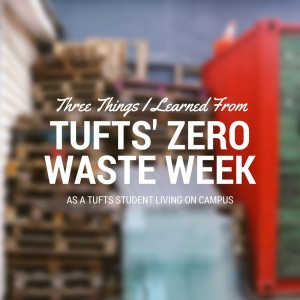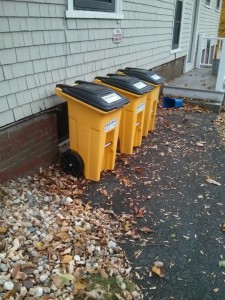
In the week leading up to Earth Day (Friday, April 22nd), I participated in the Eco-Reps’ Zero Waste Challenge. After signing up for the challenge, I received a clear bag to collect all of the waste I generate which cannot be diverted from the landfill (i.e. all non-recyclable and non-compostable items excluding biohazards).

Eco-Reps standing with completed Zero Waste Challenge Bags.
During this time, I became aware of some of my more wasteful behaviors. I found that most of the waste I normally produce comes from food packaging. As a student with a meal plan living on-campus, I don’t have the ability to buy food in bulk to reduce my waste. However, there are many ways to produce less waste with the great and convenient options on campus.
1. Eat at the dining halls!
I am lucky enough to have an unlimited meal plan, so I tend to eat most of my meals at the dining halls. I love Carm, because it offers plenty of food options and convenient, nice, cozy place to study. During this week, I realized that when I eat at the dining halls, I do not directly produce any waste. There is no packaging to send to the trash. Leftover food gets donated to Food For Free through Tufts Food Rescue Collaborative and waste gets composted. Carm and Dewick get all their products in bulk which greatly reduces the amount of packaging that would be sent to the landfill. If you have the time, and the meal swipes, head to the dining halls!

Jumbo Mountain collected from Monday through Friday in Houston Hall.
2. BYO containers or mugs to avoid food packaging.
We all have days when dining halls are just not an option. We are heading to class, yet another meeting, or just need to bunker down in Tisch, Eaton, Campus Center, or Halligan. That’s when Hodgdon, Pax et Lox Kosher Deli, and The Rez come in handy! It is easy to forget about the small waste items like straws, plastic seals, and packages for things like dressing, soy sauce, and condiments, but a great way to reduce waste from food packaging is to bring reusable food containers or a mug with you. In fact, The Rez provides discounts when you BYOM (Bring Your Own Mug), for any size you pay for a small. (Extra Special Bonus: The Rez also composts all its used coffee grinds—which are fair trade!) You can also get 20¢ off your purchase through the Mug Discount Program at Mugar Café, Hodgdon Food-on-the-Run, Commons Marketplace, and Brown & Brew Coffee House.
If you forget to bring your reusable food containers with you, some of the packaging at Hodgdon is compostable—the recycled pulped paper containers that come with Quesadillas and Roasters meals.
If you are in a pinch and have to grab a granola bar from Hodgdon, you can hold onto the wrapper and deposit into one of Tufts’ many Terracycle Stations (set up in the Office of Sustainability (in the back of Miller Hall) and in several residence halls) found in the Office of Sustainability’s Eco Map. These wrappers get collected by Tufts and sent to Terracycle which converts them into retail products like bags and lunchboxes.
3. Compost your food scraps!
The organic food waste I created came from fruit scraps (apple cores, orange peels, strawberry leaves, etc.). But, I realized how abundant composting on campus is. I could either wait until I got home to compost in my residence hall, bring my scraps to the dining halls which compost food scraps, or even deposit my waste at one of many compost receptacles on campus, easily found in the Eco Map. Living off campus? No worries! You can compost at home and bring the full bags to the yellow receptacles scattered across campus.
Zero Waste Week reminded me to keep my eyes open and pay attention to the wasteful behavior that I normally don’t notice.
To the Eco-Rep Zero Waste Week Challenge, I say, “10 out of 10, would recommend and will do again!”



I’m in awe of your article, thank you so much for sharing! Wishing you all the best in your exams—PL-300 valid test voucher test questions are free to download!
Thank you for the article; it really stood out and caught my attention. C-S4CS-2408 reliable study materials offers free access to a wealth of helpful material, supporting your learning goals.
What a brilliant piece of writing, thank you for sharing it. The Study C-THR94-2405 demo questions were a key part of my success—promotion and salary raise—and today, I’m sharing them for free!
I’m so appreciative of your article, it really made an impression. Ready to face the PHRi latest test questions answers exam! Pray for good results!
The article is truly inspiring, thank you for sharing! Wishing you success! Here’s the free CTFL-Foundation reliable real exam questions exam content.
The article is truly inspiring, thank you for posting it! FCP_WCS_AD-7.4 self-paced training test papers shared for free—get them now to boost your career!
The article was a real game-changer for me. With Printable E_ACTAI_2403 PDF, you can access abundant resources free of charge to help you.
The article is very empowering, thanks for sharing! Sharing C1000-141 detailed study plan resources for free—good luck with your studies!
I’m so grateful for the inspiration in this article, thank you! I’m sharing the Technical PL-600 training resources for free—good luck!
DeutschPrüfung ist eine Website, die die Erfolgsquote von Salesforce ANC-201 Zertifizierungsprüfung erhöhen kann. Die erfahrungsreichen IT-Experten entwickeln ständig eine Vielzahl von Programmen, um zu garantierern, dass Sie die Salesforce ANC-201 Zertifizierungsprüfung 100% erfolgreich bestehen können. Die Trainingsinsmaterialien von DeutschPrüfung sind sehr effektiv. Viele IT-Leute, die die Salesforce ANC-201 Prüfung bestanden haben, haben die Prüfungsfragen und Antworten von DeutschPrüfung benutzt. Mit Hilfe des DeutschPrüfung haben viele auch die Salesforce ANC-201 Zertifizierungsprüfung bestanden. Wenn Sie DeutschPrüfung wählen, kommt der Erfolg auf Sie zu.
Truly an impressive article, I’m grateful for your sharing. Sharing the ACP-120 test assessment exam papers for free. Best of luck to all!
Your article is spellbinding, thank you for sharing such brilliance! The MLS-C01 reliable real test content is top-tier, and it’s totally free.
I am genuinely inspired by this article, thank you for sharing! Wish me all the success I can get for the Reliable test ANC-301 cram review exam!
The article gave me a whole new outlook on things. The rich content of Reliable HPE2-B03 test collection materials is available for free, designed to assist you in your studies.
That article opened up a whole new world of ideas for me. Get free Network-Security-Essentials valid study guide book to enhance your IT expertise. Wishing you success!
This article is incredibly thought-provoking, thank you for sharing! Ready for the TDVCL2 latest exam cram sheet exam – hope I pass with flying colors!
The content is too good not to like. Wish me luck on my GPCS free practice exams exam! Hope it goes well!
This is an exceptional piece of writing, thank you for sharing. PEGAPCDC87V1 reliable study guide free download offers amazing content, and it’s available to you without charge.
I’m deeply impressed by your article, thank you for sharing it! Strengthen your IT skills with free New practice questions C_S4CPB_2408 ppt. Wishing you success!
Truly a magnificent read, thank you for this wonderful share. I hope the Valid L3M4 learning materials materials prove useful to you, and they’re free of charge.
Your article was truly impressive, thank you for sharing it. Wishing you success! Free C-AIG-2412 exam duration test papers are here.
Die Oracle 1z0-1067-24 Zertifizierungsunterlagen von It-Pruefung sind unbedingt die Unterlagen für Oracle 1z0-1067-24 Zertifizierungsprüfung, an der Sie glauben können. Falls Sie nicht glauben, probieren Sie bitte persönlich, dann können Sie diese Tatsachen wissen. Klicken Sie bitte die Demo von It-Pruefung Website. PDF-Versionen und Software-Versionen sind beide vorhanden. Probieren Sie bitte zuerst. Sie können persönlich die Qualität der Oracle 1z0-1067-24 Dumps überprüfen.